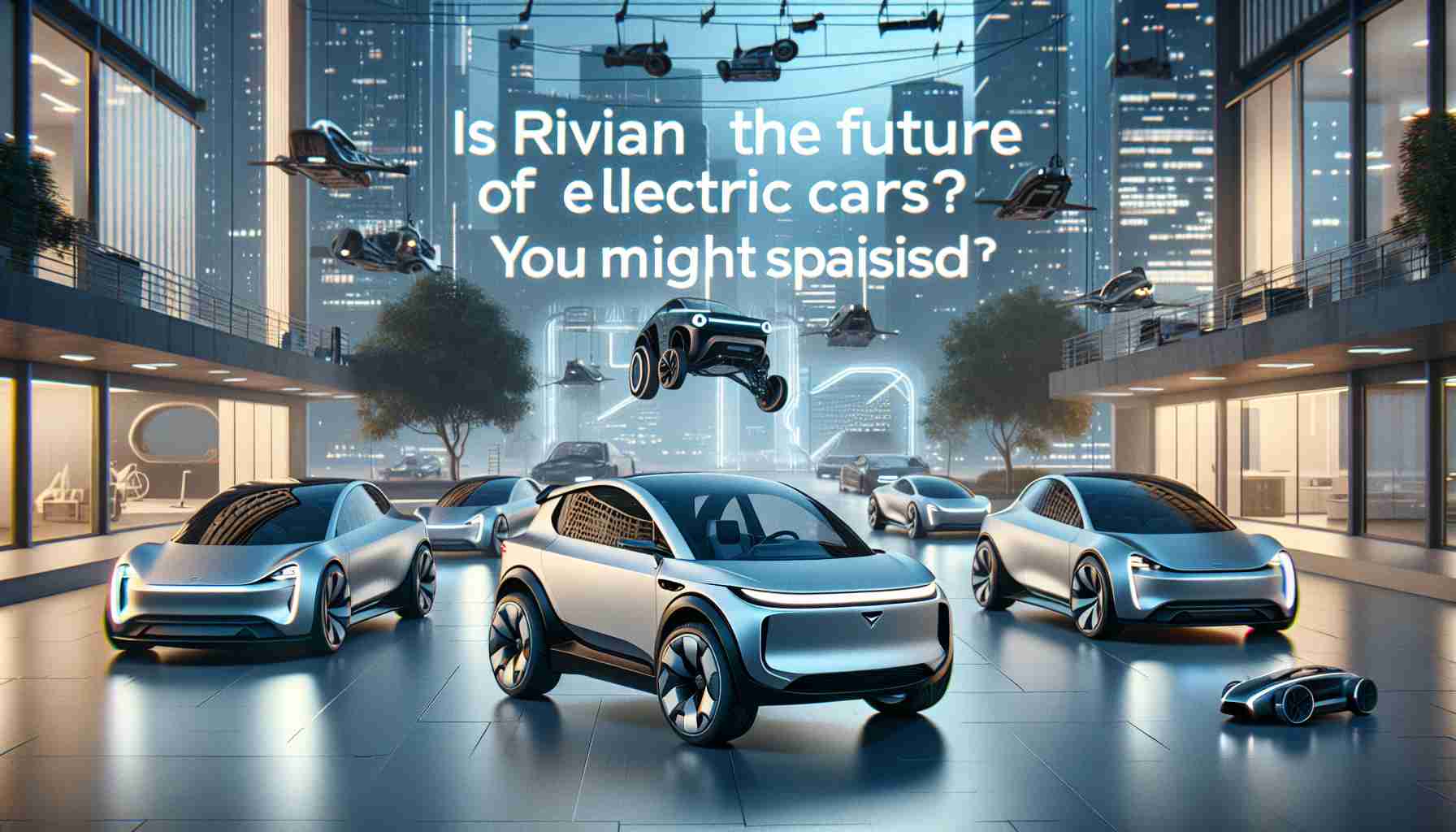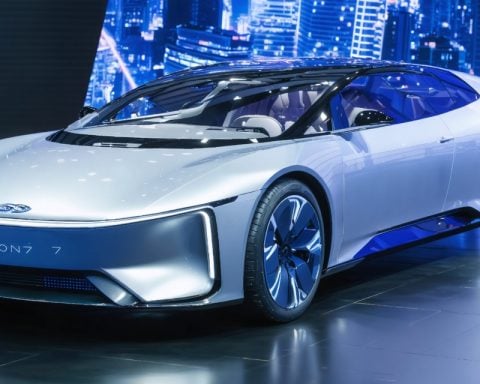Durable Players in a Volatile Market
Electric vehicle (EV) stocks have experienced significant turbulence, especially for newcomers like Rivian Automotive and Lucid Group. Over the past three years, Rivian’s stock has plummeted by 79% while Lucid’s has dropped a staggering 92%. Despite these challenges, a glimpse of optimism shines through as EV sales in the U.S. saw a 7% uptick last year, reaching a total of 1.3 million units.
Lucid Group has garnered praise for its luxurious Air sedan, winning multiple prestigious awards such as MotorTrend’s 2022 Car of the Year. However, despite its critical acclaim, Lucid struggles with financial performance—reporting just $200 million in revenue and a staggering net loss of $992 million in the last quarter. While vehicle deliveries showed a 91% boost to 2,781 vehicles, production levels remained modest at just 1,805 units.
In contrast, Rivian has faced its own set of challenges. The company reported a decrease in production from the previous year, totaling 49,476 vehicles, although deliveries did rise slightly. Encouragingly, Rivian has undertaken significant cost-reduction efforts, cutting material costs by 35%, which positions them favorably for future profitability.
Ultimately, with plans to introduce more affordable models like the R2 and R3 in the coming years, Rivian appears to be navigating these rough waters more effectively. As the EV landscape continues to evolve, Rivian may emerge as a stronger contender for investors looking to capitalize on the electric vehicle revolution.
Implications of the Electric Vehicle Market Evolution
The landscape of the electric vehicle (EV) market is not just a reflection of corporate performance; it reverberates through societal dynamics, cultural shifts, and even the global economy. As more consumers embrace sustainable transport solutions, the implications extend far beyond the sales figures of companies like Rivian and Lucid. The transition to electric vehicles is reshaping urban planning, infrastructure, and the very fabric of everyday travel choices.
With EV sales climbing, there is a push for governments to bolster charging infrastructure, which will inevitably lead to job creation in both technology and construction sectors. This increased accessibility could drive down costs and make electric vehicles a viable option for a broader demographic, contributing to a shift in consumer attitudes towards sustainability. As vehicles become more embedded in the cultural narrative around environmental responsibility, the stigma associated with electric cars as a luxury item may begin to fade.
However, the environmental implications are equally profound. While electric vehicles significantly reduce tailpipe emissions, the production and disposal of batteries pose serious challenges. Sustainable practices for mining materials such as lithium and cobalt are crucial to ensure that the progress in green transportation does not come at the expense of the planet. As companies innovate to solve these issues, the focus on more sustainable battery technology like solid-state batteries could redefine the industry.
As we gaze toward the future, the rivalry between established automakers and new players may foster an accelerated pace of innovation. The outcome of this competition will shape the global economy, establishing new markets and trading dynamics in the burgeoning EV sector. The trajectory of EV manufacturers serves as a microcosm for broader economic trends and challenges in the 21st century, emphasizing the need for resilience in the face of volatility.
Is the Electric Vehicle Market Shifting? Insights on Rivian and Lucid
Current Trends and Market Analysis of Electric Vehicle Stocks
The electric vehicle (EV) market has been characterized by volatility, particularly for newer entrants like Rivian Automotive and Lucid Group. After considerable stock price declines—79% for Rivian and an impressive 92% for Lucid—it is crucial to assess their current operational strategies, market positioning, and future prospects.
Market Performance and Sales Growth
Despite the significant dips in stock prices, the overall EV market in the U.S. continues to demonstrate growth. In the last year, EV sales climbed by 7%, marking 1.3 million units sold, which suggests a robust consumer interest in electric vehicles. This indicates that while individual companies may struggle, the market as a whole is expanding, providing a potential pathway for recovery for affected manufacturers.
Company Overview: Lucid Group
Lucid Group has found some acclaim for its flagship luxury sedan, the Lucid Air. It received accolades such as MotorTrend’s 2022 Car of the Year, highlighting its innovative features and design. However, the company has reported a meager revenue of $200 million alongside an alarming net loss of $992 million in the latest quarter. Although vehicle deliveries surged by 91%, totaling 2,781 units, production capacity remains low at only 1,805 units. This presents significant concerns about Lucid’s scalability and long-term sustainability.
# Pros and Cons of Lucid Group
Pros:
– Award-winning luxury vehicle design and features.
– Strong brand recognition within the high-end market.
Cons:
– Substantial net losses and inadequate production scalability.
– Financial instability raises concerns among investors.
Analysis of Rivian Automotive
Rivian has faced challenges as well, reporting a slight decrease in production levels to 49,476 vehicles. However, they have seen a moderate increase in vehicle deliveries, which points to improving operational efficiency. Remarkably, Rivian has implemented aggressive cost-cutting strategies, reducing material costs by 35%, enhancing their prospects for future profitability.
Rivian’s strategy to launch more affordable models, such as the R2 and R3, could broaden its appeal to different segments of the market, and potentially boost sales. This approach aligns with trends favoring more accessible electric vehicles for a broader customer base.
# Pros and Cons of Rivian
Pros:
– Significant cost-reduction initiatives that improve profitability.
– Plans to introduce more affordable vehicle models.
Cons:
– Lower production compared to previous years.
– Continual stock price volatility amid broader market challenges.
Future Predictions and Trends
Looking forward, analysts predict that the EV market will continue to evolve. Factors such as increasing consumer demand, advancements in battery technology, and favorable governmental policies are expected to play significant roles. As Rivian enhances its production capabilities and diversifies its product offerings, it is likely to attract investors seeking exposure to the expanding electric vehicle sector.
Conclusion
The electric vehicle landscape is undergoing significant changes, and companies like Rivian and Lucid are pivotal players within this market. While both face hurdles, their strategies could dictate future success. Rivian’s focus on affordability and cost-efficiency places it at a potential advantage, while Lucid’s high-end niche maintains its allure despite financial difficulties.
For more insights on electric vehicles and the evolving automotive market, visit Forbes.















